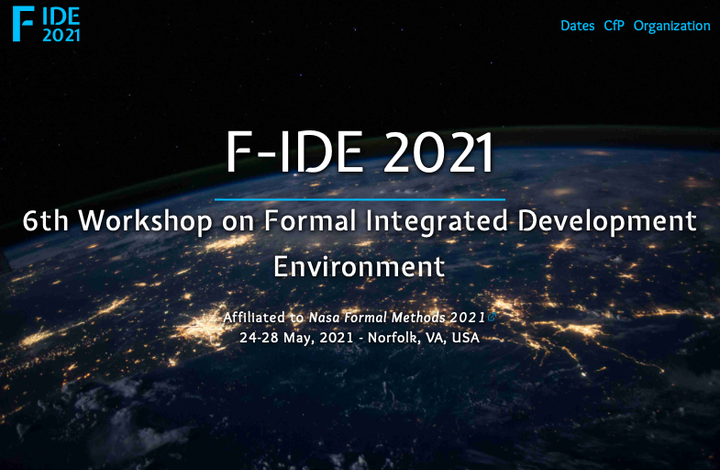F-IDE 2021 @ NFM
PC chair of the 6th Workshop on Formal Integrated Development Environment

https://cister-labs.pt/f-ide2021
6th Workshop on Formal Integrated Development Environment
Affiliated to NASA Formal Methods 2021 (NFM)
24-28 May, 2021 - Online event - Norfolk, VA, USA
Important dates
- Abstract submission: 22 February 2021
- Paper submission: 1 March 2021
- Notification: 19 April 2021
- Camera-ready version: 3 May 2021
Aims
High levels of safety, security and also privacy standards require the use of formal methods to specify and develop compliant software (sub)systems. Any standard comes with an assessment process, which requires a complete documentation of the application to ease the justification of design choices and the review of code and proofs.
Ideally, an F-IDE dedicated to such developments should comply with several requirements. The first one is to associate a logical theory with a programming language, in a way that facilitates the tightly coupled handling of specification properties and program constructs. The second is to offer a language/environment simple enough to be usable by most developers, even if they are not fully acquainted with higher-order logics or set theory, in particular by making development of proofs as easy as possible. The third is to offer automated management of application documentation. It may also be expected that developments done with such an F-IDE are reusable and modular. Tools for testing and static analysis may be embedded within F-IDEs to support the assessment process.
Topics
The workshop is open to contributions on all aspects of a system development process, including specification, design, implementation, analysis and documentation. It welcomes the presentation of tools, methods, techniques and experiments. Topics of interest include, but are not limited to, the following:
- F-IDE building: design and integration of languages, development of user-friendly front-ends
- How to make high-level logical and programming concepts palatable to industrial developers
- Integration of Object-Oriented and modularity features
- Integration of static analyzers
- Integration of automatic proof tools, theorem provers and testing tools
- Documentation tools
- Impact of tools on certification
- Experience reports on developing F-IDEs
- Experience reports on using F-IDEs
- Experience reports on formal methods-based assessments in industrial applications
Program Committee
- Andrew Reynolds, University of Iowa, USA
- Damien Doligez, Inria, France
- Bernhard Rumpe, RWTH Aachen University, Germany
- Carlo A. Furia, Chalmers University of Technology, Sweden
- César Muñoz, NASA Langley, USA
- Cinzia Bernardeschi, University of Pisa, Italy
- Claudio Sacerdoti Coen, University of Bologna, Italy
- Enrico Tassi, Inria, France
- François Pessaux, ENSTA ParisTech, France
- José Creissac Campos, University of Minho, Portugal
- Kenneth Lausdahl, Aarhus University, Denmark
- Laurent Voisin, Systerel, France
- Lucas Wagner, Collins Aerospace, USA
- Makarius Wenzel, sketis.net
- Markus A. Kuppe, Microsoft Research, USA
- Mattias Ulbrich, Karlsruhe Institute of Technology, Germany
- Pierre-Yves Strub, LIX, École Polytechnique, France
- Rosemary Monahan, Maynooth University, Ireland
- Silvia Lizeth Tapia Tarifa, University of Oslo, Norway
- Simão Melo de Sousa, Universidade Beira Interior, Portugal
- Stefan Mitsch, Carnegie Mellon University, USA
- Stephan Merz, Inria, France
- Virgile Prevosto, Institut List, CEA Tech, Université Paris-Saclay, France
- Yannick Moy, AdaCore, France
- Yi Zhang, Massachusetts General Hospital, USA
PC Chairs
- Andrei Paskevich, Université Paris-Saclay, France
- José Proença, CISTER/ISEP, Portugal
Steering Committee
- Catherine Dubois, Samovar, ENSIIE, France
- Paolo Masci, US National Institute of Aerospace (NIA), USA
- Dominique Méry, LORIA, Université de Lorraine, France